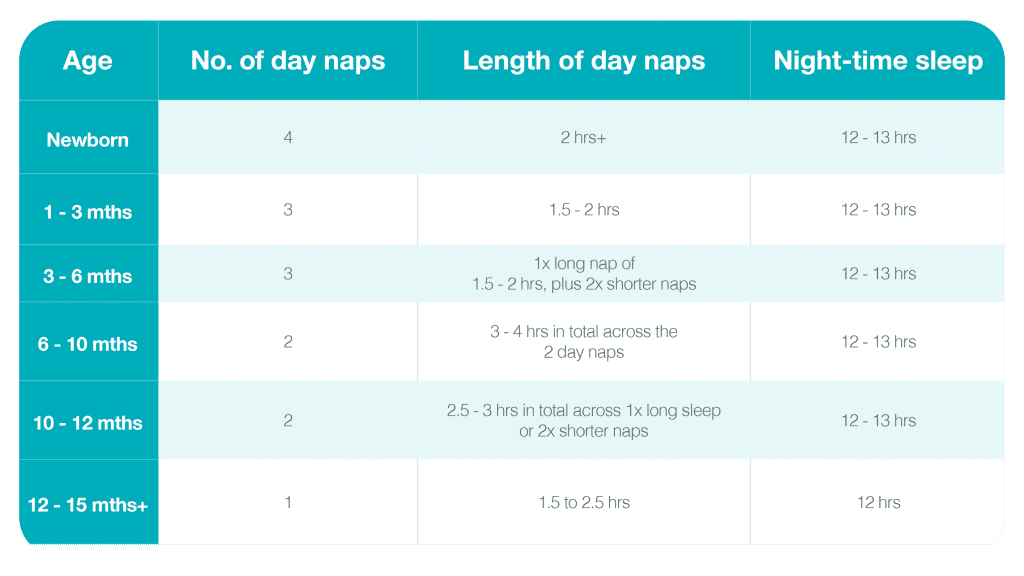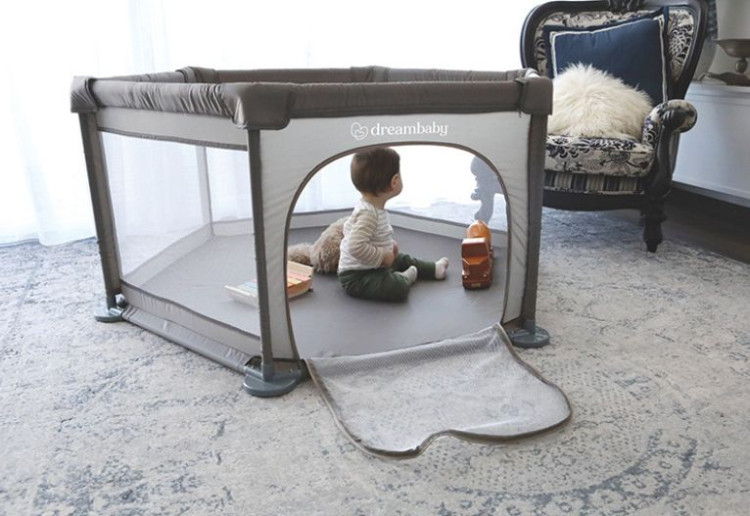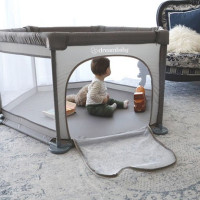What is baby sleep actually like? We’ve got the answers you need to know!
At some point, though maybe not recently, most of us have used the phrase ‘I slept like a baby’ – but what does it actually mean? While baby sleep is so different in so many ways for each child, there is a common science behind it. Knowing what goes down when your baby is sleeping may make it easier for you to figure out how best to support their sleep routine and also keep your own sleep on track!
The first thing to note is that baby sleep is different to adult sleep. Whether you have a great sleeper, or a little one who parties all night, the fact is that baby’s sleep cycles are different to ours. As they grow, their sleep will evolve and by the time they are school age, their sleep cycles will be more similar to adults. Love To Dream has taken the guesswork out of baby sleep and put together some easy to read information to help you navigate the sleep journey with your newborn.
Newborn Sleep Cycles
In the first few weeks after birth, babies sleep most of the day and night, with many babies sleeping 14 -20 hours a day. Though this sounds fantastic to a sleep-deprived mum or dad, it’s key to understand that these hours won’t happen in one big block. Newborns usually sleep in short 2-3 hour bursts throughout the day and night.
While this makes the case for very tired parents, there is some science behind the reasons why.
When babies are born, they don’t know the difference between day and night. They’ve just spent months in a dark, cosy womb, cycling through being awake and asleep, blissfully unaware of our day & night rhythm. When they finally enter the world, their little body clocks need to be set up and until that happens, they can have their days and nights confused.
Then there’s the size of their tummy. It’s hard to imagine but the day your baby is born their stomach is about the size of a marble (tiny!) and by day 10, it’s only the size of a golf ball. These tiny tummies don’t hold much, so babies need them to be filled and re-filled quite frequently. The repetitive cycle of waking and feeding around the clock helps ensure they are getting the nutrition they need to support their growth and development. (Remember – to ensure your baby is growing at a healthy rate, it is important to attend your scheduled health check-ups with your GP, child health nurse or paediatrician.)
Rest assured; this phase does not last forever! As your baby grows (usually between the 6 to 8 week mark) they will begin to differentiate between night and day, and your baby will probably start waking less often and have a longer period of sleep overnight.
Baby Sleep Cycles & Types Of Sleep
Babies wake through the night because of their sleep cycles. As you learn about these (and we promise it’s not that complicated) you’ll have a better understanding of what is going on when they sleep, and why they may be rousing often.
Babies, infants, teens, adults – we all have sleep cycles. Over the course of a night, our sleep is made up of several rounds of cycles where our sleep varies through different types and stages of sleep.
There are 2 types of sleep:
- REM (Rapid Eye Movement) sleep, also known as Active Sleep
- Non-REM sleep, also known as quiet or deep sleep
Non-REM sleep is made up of four stages, while there is only one stage of REM sleep.
Progressing smoothly multiple times through these sleep cycles and different stages of sleep is a vital part of getting truly high-quality rest.
So what does that mean for your little one?
Full term newborn babies typically have sleep cycles around 40 minutes long. This means that every 40 minutes that your baby is asleep, they have cycled through deeper and lighter sleep, and if you are watching them very closely, (or holding them!) you may be able to observe these lighter and deeper phases through their movements.
Young babies make a lot of noise when they are in REM sleep because they do not have REM-sleep paralysis the way adults do. You will notice during the lighter, active REM sleep that your baby may start to move; their eyelids will flicker, their fingers and toes wriggle, they may open and close their eyes and mouth or kick their legs. Older babies may even laugh and “practice” motor skills such as rolling, rocking on all fours, and even sitting. Babies can usually be woken more easily during this lighter sleep, so ensuring an ideal sleep environment throughout the night is essential.
During quiet, deep or non-REM sleep, newborns are still. Their breathing is deep and regular. Babies may be able to sleep through more noise at this time or more difficult to wake during this deeper sleep.
The Five Stages Of Sleep
Typically newborn babies will drift through 5 different sleep stages during a sleep cycle;
Stage 1: Drowsiness, as baby starts to drift off to sleep.
Stage 2: REM sleep. This is the stage where brain activity peaks. You may see your baby’s eyelids flicker, their eyes move around under closed eyelids, limbs and face will twitch and they may kick their legs and open and close their eyes.
Stage 3: Light sleep, in which breathing becomes more regular and sleep becomes less active.
Stages 4 and 5: Deep non-REM sleep, where breathing is deep and regular, and your baby becomes more likely to sleep through the noise.
Understanding these different stages of baby sleep can be really helpful when you’re laying the 4 foundations for healthy sleep and supporting your baby to sleep better and longer.
It can be easy to mistake your baby’s lighter stages of sleep with them waking up, due to their movements, sounds and eyes opening and closing. If you go in to check on them too soon, you may accidentally wake them in the middle or between sleep cycles. Considering which sleep stage your bub is in when you first hear them stir, can make it easier to hold off from rushing into them. By waiting a little, you’re allowing them time to move through all of the sleep stages in each cycle and also help them to start to learn to self-soothe and connect their sleep cycles – resulting in better quality and longer sleep.
Understanding the differences in the sleep stages can also help you plan your day in terms of quieter or noisier activities particularly when you have an older toddler or child at home, & you don’t have to juggle your older kids and baby’s sleep. If you know your baby’s sleep cycles, then you may know when they are more easily woken compared to when they are in a deeper sleep.

How long do baby sleep cycles last?
Baby’s sleep cycles change as they get older. In the early days of your baby’s life, the sleep cycle is around 40 minutes, and evenly divided between light and deep sleep. As we get older, our sleep cycles get longer and the time we spend in lighter sleep decreases. So, by the time we’re adults, we spend around 20-25% of the night in light sleep (compared to around 50% as babies) and our sleep cycles are 90-120 minutes (compared to around 40 minutes as newborns).
As baby’s sleep cycles increase in length, they are able to decrease their naps (as they can stay awake for longer periods of time).
After the newborn stage the way we fall asleep and transition through the stages of sleep changes. Instead of first drifting into lighter REM sleep then deeper sleep, we first transition through 4 stages of non-REM sleep, then cycle back up through the lighter stage of sleep.
As your baby grows and develops, their sleep cycles will change, and so might your night-time routine. For the first 6-8 weeks you might feel overwhelmed as your baby seems to need you very often for feeding and changing, but this is completely normal, and it won’t last forever. As your baby slowly begins to comprehend the difference between night and day, their tummies get bigger and you begin to lay the foundations for healthy sleep, you can look forward to longer stretches of overnight sleep, which means a bit more sleep for tired mums and dads.
While you are navigating your way through the world of baby sleep and disrupted nights, try to remember some facts about sleep cycles and the stages of sleep they go through. It may help you work out when your baby needs your assistance and what sort of support you should give them.
When you find yourself awake in the middle of the night wanting to give up, it’s worth remembering that great saying about parenthood – “the nights are long, but the years are short” These sleepless nights won’t last forever and with the right tools and support you can get through them that little bit easier. A good night’s sleep could be just around the corner.
How did you cope with the sleepless nights? Share your tips in the comments!
Visit Love To Dream
For more information, and to buy Love To Dream products online, visit the links below.
Visit Love To Dream Australia Here
Visit Love To Dream UK Here
Get Social
Instagram Australia: https://www.instagram.com/lovetodreamaustralia/
Facebook Australia: https://www.facebook.com/LoveToDreamAU
Instagram UK: https://www.instagram.com/lovetodream_uk/
Facebook UK: https://www.facebook.com/LoveToDreamUK

This article is brought to you by Love To Dream, who produce global award-winning swaddles, sleep bags and sleep suits from newborn to toddler.
We may get commissions for purchases made using links in this post. Learn more.




















8:32 am
7:59 am
11:39 pm
1:39 am
11:17 pm
11:17 am
8:13 pm
11:21 am
12:15 am
8:45 pm
11:10 pm
9:09 pm
9:07 am
7:40 pm
6:53 am
- 1
- 2
- 3
- »
Post a comment